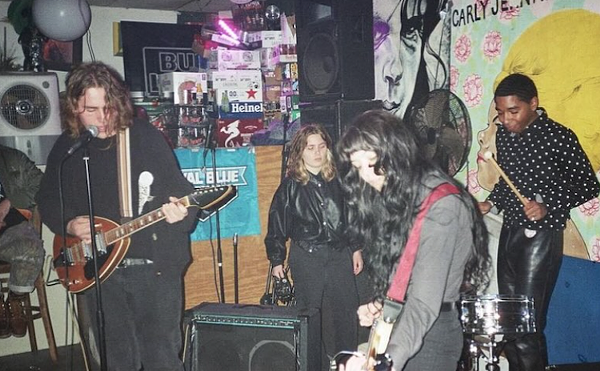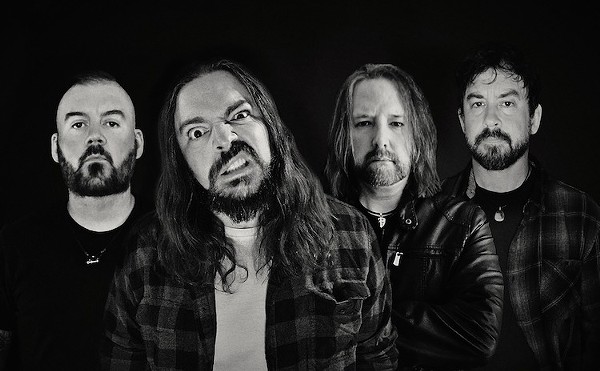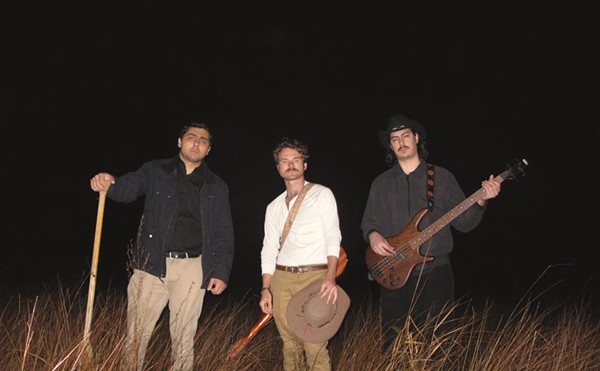Sometime around 1300-1500 B.C., there was a group of folks referred to as the "sea people." Not much is actually known about them other than that they were a ship-robbing, slave-taking, treasure-stealing pain in the ass for kingdoms in and around the Mediterranean, particularly for the pharaohs of Egypt. In the three or four millennia since then, piracy has gone from being a pain in the ass, to being a problem, to being nonexistent, to being a problem again. Pirates have been feared, romanticized and trivialized. And although high-seas robbery has once again captured the headlines, when you say "pirate" to someone these days, the response is usually "I got wasted at Gasparilla," "Sharing music isn't stealing" or "Is it Talk Like a Pirate Day already?"
That's a state of affairs that the members of Alestorm are likely displeased with, for this is a band that takes their Jolly Rogers seriously. The Scottish "pirate metal" group released their debut album, Captain Morgan's Revenge, early last year. They were formerly known as Battleheart, but changed their name to more accurately reflect their dedication to piratical themes. Battleheart/Alestorm's EPs had names like Terror on the High Seas and Heavy Metal Pirates, so it was only logical that, upon signing a deal with underground metal label Napalm, they would re-brand themselves with something that more instantly reflected their wenches-and-mead ideology. At least something beyond their song "Wenches and Mead."
However, the album was neither the first nor only "pirate metal" album; earlier releases from bands like Verbal Deception and Running Wild could easily be categorized in the nascent genre. Furthermore, there's absolutely zero ambiguity about the intent of New Jersey's Swashbuckle; the by-the-numbers thrash of their 2006 album Crewed by the Damned was only made exceptional by the lyrical whimsy of numbers like "Walk the Plank," "Rum Runners" and "Dead Men Tell No Lies."
As silly as all this may seem — and, honestly, it's all a little silly — it's not without precedent or context. The metal community has, for the past few years, been riding a wave of interest in so-called "pagan metal" and "folk metal." Taken up largely by European acts, these genres move well beyond the hair-splitting subcategories typically assigned to heavy bands' sounds and instead stake out a highly singular form of music. From lyrical content to compositions and instrumentation rooted in centuries-old traditions, pagan, folk and pirate metal are instantly identifiable subgenres that have far less to do with standard preconceptions about metal than other easily confused offshoots like black/death/power metal.
Finntroll sings about trolls and incorporates traditional Finnish polka into their black metal. Potsdam, Germany's Subway to Sally plays bagpipes, violins and hurdy-gurdys. Korpiklaani was a Finnish folk band before they integrated fiddles, flutes, accordions and yoiking into a jaunty, jig-worthy thrash attack. (Finntroll, along with Tyr, Ensiferum, Moonsorrow and Eluveitie, constituted the lineup of 2008's inaugural Paganfest tour; 2009's tour is set for the fall.)
The most exotic instrumentation utilized by Alestorm is Christopher Bowes' keytar, but that doesn't make their melodic flights of fancy any less intriguing. It may not be the most threatening metal show around, but an Alestorm set is one of the most interesting … or at least one of the drunkest.
[email protected]
















